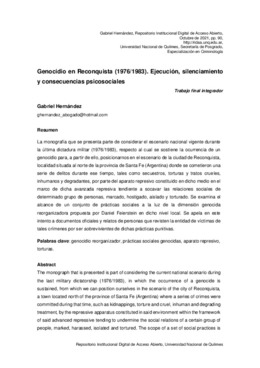Genocidio en Reconquista (1976/1983). Ejecución, silenciamiento y consecuencias psicosociales
Abstract
La monografía que se presenta parte de considerar el escenario nacional vigente durante la última dictadura militar (1976/1983), respecto al cual se sostiene la ocurrencia de un genocidio para, a partir de ello, posicionarnos en el escenario de la ciudad de Reconquista, localidad situada al norte de la provincia de Santa Fe (Argentina) donde se cometieron una serie de delitos durante ese tiempo, tales como secuestros, torturas y tratos crueles, inhumanos y degradantes, por parte del aparato represivo constituido en dicho medio en el marco de dicha avanzada represiva tendiente a socavar las relaciones sociales de determinado grupo de personas, marcado, hostigado, aislado y torturado. Se examina el alcance de un conjunto de prácticas sociales a la luz de la dimensión genocida reorganizadora propuesta por Daniel Feierstein en dicho nivel local. Se apela en este intento a documentos oficiales y relatos de personas que revisten la entidad de víctimas de tales crímenes por ser sobrevivientes de dichas prácticas punitivas. The monograph that is presented is part of considering the current national scenario during the last military dictatorship (1976/1983), in which the occurrence of a genocide is sustained, from which we can position ourselves in the scenario of the city of Reconquista, a town located north of the province of Santa Fe (Argentina) where a series of crimes were committed during that time, such as kidnappings, torture and cruel, inhuman and degrading treatment, by the repressive apparatus constituted in said environment within the framework of said advanced repressive tending to undermine the social relations of a certain group of people, marked, harassed, isolated and tortured. The scope of a set of social practices is examined in light of the genocidal dimension of reorganization proposed by Daniel Feierstein at that local level. Appeals are made in this attempt to official documents and accounts of persons who are the victims of such crimes because they are survivors of said punitive practices.

